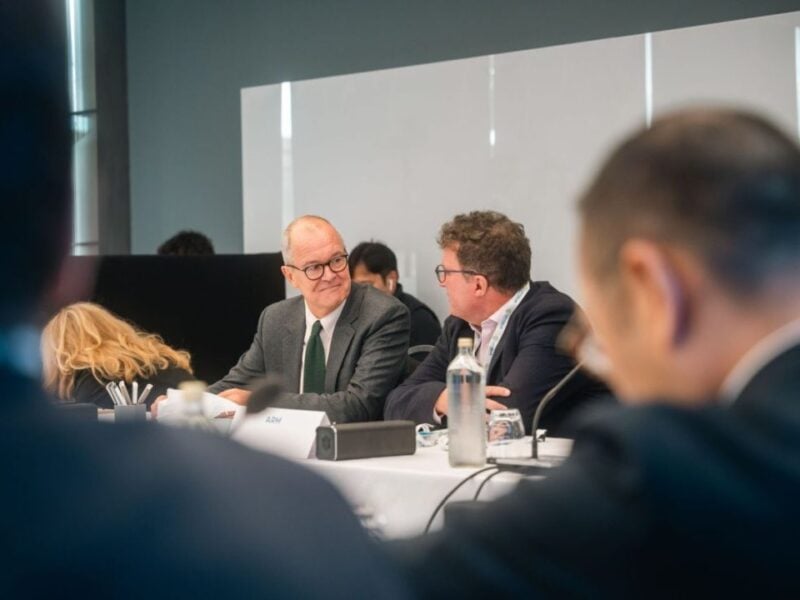
Full list of £11m for UK chip ‘scale up’
The UK government has announced 16 semiconductor projects that will share £11.5m to scale up development.
The £11,5m (€14m) from Innovate UK is intended to scale up chip development, although the initial amounts are all under £1m and many are for startups with university links. It also includes Vishay as the new owner of Newport Wafer Fab.
The science Minister Lord Patrick Vallance (above, centre) announced the projects as he opened the G7 Semiconductors Point of Contact group in Cambridge, UK, focussed on semiconductors.
The Contact Group met at ARM’s HQ in Cambridge with member states, research organisations, and industry representatives discussing key issues affecting the global semiconductor industry, like supporting early-stage innovation and sustainability.
This meeting immediately follows the OECD Semiconductor Informal Exchange Network gathering, where countries and stakeholders shared strategies for strengthening global semiconductor supply chains and addressing shared challenges in the semiconductor industry.
“Semiconductors are an unseen but vital component in so many of the technologies we rely on in our lives and backing UK innovators offers a real opportunity to growth these firms into industry leaders, strengthening our £10 billion sector and ensuring it drives economic growth,” said Science Minister, Lord Vallance.
“Our support in these projects will promote critical breakthroughs such as more efficient medical devices that could significantly lower costs and faster manufacturing processes to improve productivity.”
The scale up funds include Vector Photonics in collaboration with the University of Glasgow for GaN blue lasers in medical equipment, quantum displays and car headlights.
Quantum Advanced Solutions with the University of Cambridge, is developing advanced shortwave infrared (SWIR) sensors which improve vision in critical sectors like defence, by supporting surveillance in challenging conditions in low-visibility environments, such as during adverse weather conditions or atmospheric disturbances.
The project looks to simplify production using innovative quantum dot materials – tiny semiconductor particles that emit light at specific wavelengths – offering higher sensitivity and performance, cutting costs and making this advanced technology more accessible to multiple sectors including manufacturing and healthcare.
Other companies supported by the funding is Quinas Technology, a spin out of Lancaster University developing a new memory architecture and materials specialist IQE in Wales.
The full list is:
- Industrial Epitaxy of ULTRARAM Computer Memory – Quinas Technology, Cardiff University, IQE, Lancaster University
- UpQSens: Upscaling manufacture of quantum dot-based CMOS SWIR Sensors – Quantum Advanced Solutions LTD, University of Cambridge
- Developing new UK packaging capability for highly miniaturised, compound semiconductor-based photovoltaic components to enable autonomous and sustainable IoT at scale – Lightricity, Alter Technology, TUV Nord UK.
- Commodity High Performance InP lasers on a 6″ wafer platform (CHIPIN6) – Compound Semiconductor Centre, Protonec, SPTS Technologies, Cardiff University
- FlexPlanner/FAR: Automated Solutions to dramatically improve wafer-fab efficiency, while simultaneously reducing reliance on manufacturing skilled labour – Flexciton, SeagateIreland.
- sCale up of Avalanche Photodiodes for future TerAbIt optical Networks (CAPTAIN) – Phlux Technology, Sivers Photonics, Hilight Semiconductor, University of Sheffield
- Semiconductor Impact Calculator ‘RESiLABLE’ to deeply decarbonise and increase supply-chain resilience of UK semiconductor manufacturing – Minviro, Swansea University
- Industrial Development of novel photoresists for high-NA EUV enabling UK-based semiconductor manufacturing scale-up – Irresistible Materials, Endevour Speciality Chemicals.
- Onshoring and Scale Up of 3c-SiC substrates for cubic GaN microLEDs – Kubos Semiconductors, Advanced Epi Materials, Oxford Instruments, Wafer Technology
- UK Integrated Supply Chain to support Vishay – UKISC-V – RAM Innovations, Kuasa Semi, Vishay
- Enhancement of Power Devices with 3C-SiC – IceMOS Technology, University of Warwick
- UK-GRAFT: The UK Graphene Research and Fabrication Technology Foundry Paragraf, UKESF, University of Birmingham, Cupio Services, University of Glasgow
- Establishing new manufacturing techniques for high-value semiconductor manufacturing of X-ray dosimeters for radiotherapy in the UK – Silverray, University of Surrey
- Gallium nitRide based Advanced PHotonIc Crystal Structures (GRAPHICS) – Vector Photonics, University of Glasgow
- INTERPOSE-UK – Advanced INTegratEd ciRcuit interPOsers for SEmiconductor packaging in UK – BAe Systems Oxford Lasers, PRP Optoelectronics, University of Southampton
- APEX-G ( Advanced high-power, extended-wavelength VCSEL arrays for volume infrared and green laser applications) – Integrated Compound Semiconductors, NPL, Microchip Caldicott, CSC
“Innovate UK’s investment in this programme directly supports the National Semiconductor Strategy launched in 2023 and aims to ensure the UK’s place in the global landscape,” said Andrew Tyrer, Deputy Director, Electronics, Sensors and Photonics, Innovate UK.
The UK is playing a key role in the OECD’s efforts to unite government and industry in navigating the complexities of the global chip supply chain.
A new report by Perspective Economics reveals the UK semiconductor sector, which includes over 200 companies in research, design, and manufacturing, is valued at almost £10 billion and could grow up to £17 billion by 2030.
“This report represents the first detailed economic study of the UK Semiconductor sector in many years. I am proud to have been part of this important work and pleased with the results. Key findings here show that the UK already sees significant revenue from the sector and, by building on strong innovation, we can see significant opportunity to increase this together with our ~2% share of global semiconductor revenues; ultimately creating much more than the 86,000 jobs currently in the wider economy,” said Charles Sturman, CEO of TechWorks.
Look out for more analysis from eeNews Europe on this report.
 If you enjoyed this article, you will like the following ones: don't miss them by subscribing to :
eeNews on Google News
If you enjoyed this article, you will like the following ones: don't miss them by subscribing to :
eeNews on Google News






